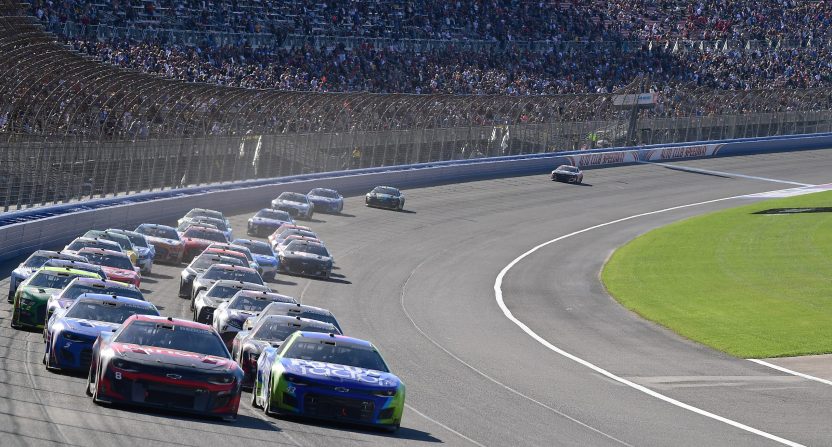NASCAR’s next media rights contract won’t start until 2025, but those in charge of the sport are preparing for negotiations. When NASCAR begins negotiations with networks next year, they might be negotiating with the race teams as well.
According to Adam Stern at Sports Business Journal, the Race Team Alliance has hired a consultant to “assess their media value” as they possibly seek a bigger piece of the media revenue pie. Currently, 65 percent of media revenue goes to the track, 25 percent goes to the teams, and 10 percent goes to NASCAR. Stern also reports that NASCAR is looking to retain their media consultant, Sports Media Advisors founder and CEO Doug Perlman (recently seen consulting on U.S. Soccer’s deal with WarnerMedia), as he assisted with NASCAR’s current rights deal.
One reason for teams possibly seeking a higher percentage of media revenue is that a higher percentage would lower their reliance for sponsorship. Sponsorship would still be an important part of funding a team, but more TV money would further diversify their revenue streams and become more financially stable in the long run. Especially if a major sponsor ever decided to leave a team.
This can also play into NASCAR’s hands if they want to have a streaming component in the next contract. NASCAR president Steve Phelps noted last week that broadcast TV is still important because teams depend on sponsorship and need to be in front of as many eyeballs as possible. But that doesn’t mean NASCAR is completely turning away streaming, as SVP of Media and Productions Brian Herbst said last year that streaming would “play a larger role.” If teams get more money up front and aren’t as sponsorship dependent, they might be more open to embracing streaming, where sponsorship value might go down but the rights fee would go up as a result.
23XI Racing co-owner Michael Jordan’s financial adviser Curtis Polk talked to Stern about how NASCAR teams are so sponsorship-dependent. Polk and Jordan have been teaching 23XI Racing co-owner Denny Hamlin about what they’ve learned from their team ownership in stick and ball sports and how that economic model might benefit NASCAR teams.
“One of the things we’ve learned is the economics of the sport, and I think the sport is a sleeping giant, but from the team ownership side it’s very sponsor-dependent, and we need to address that model,” said Polk.
“Michael and I could add a lot of info we’ve learned from being with the NBA for many years and also owning a Major League Baseball team,” added Polk (Jordan has a stake in the Marlins), “so that’s what we’ve been working on a lot with Denny is to help educate him as to what a better economic model might be and to help develop that and hopefully we’ll have a lot of ears that will listen to us.”
It’s too early to predict if teams will be able to get more of the media revenue. While the focus of Stern’s piece is on teams trying to diversify, the same can be said about the tracks. While they get the highest percentage of TV revenue, racetracks won’t want to accept less because that would make them more dependent on ticket sales. It’s a good thing NASCAR has some time to work out a deal because there’s plenty of time to work something out.






